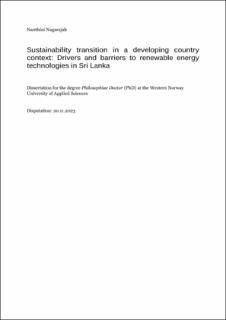Sustainability transition in a developing country context: Drivers and barriers to renewable energy technologies in Sri Lanka
Doctoral thesis
Accepted version
Permanent lenke
https://hdl.handle.net/11250/3101538Utgivelsesdato
2023Metadata
Vis full innførselSamlinger
Originalversjon
Nagarajah, N. (2023). Sustainability transition in a developing country context: Drivers and barriers to renewable energy technologies in Sri Lanka [Doctoral dissertation, Western Norway University of Applied Sciences]. HVL Open.Sammendrag
Developing countries are evidently moving slowly in utilising emergent and matured renewable energy technologies (RET) to address the global call to bring about effective global decarbonisation and net zero emissions of greenhouse gases to limit global temperature rise to 1.5 degrees. The global decarbonisation effort primarily refers to the fundamental restructuring of established energy systems with a technological shift, with a decline in fossil fuels and a rise in renewables. In this global effort, transition studies recognise the need for socio-technical transition emphasised through theories and concepts developed and applied for developed countries. The geography of sustainability transition (GeoST) literature emphasises the need to pay attention to the context in which the transition emerges. In doing so, it informs the challenges of defining and operationalising sustainability transition with existing theories and concepts, as each context is intertwined with unique characteristics. This necessitates the need for revisiting and further developing theories and concepts for such contexts.
This dissertation aims to understand and document the contextual conditions influencing sustainable energy transition processes linked to the implementation of RETs in Sri Lanka, a developing country. The dissertation achieved its objectives by way of applying the sustainability transition precepts of technology-centred technological innovation system theoretical framework and focusing its research on answering its research questions, namely: (i) What contextual conditions influence sustainable energy transition processes linked to the implementation of RETs in Sri Lanka? (ii) How does the study inform the GeoST literature in developing countries? and (iii) In what way can the study stimulate policy scaling up of RETs in Sri Lanka?
The dissertation employed a qualitative case study approach. The study gathered data from multiple sources related to the power sector in Sri Lanka. This included data utilised from 50 semi-structured interviews with stakeholders associated with the whole spectrum of responsibility related to sustainable energy transition in the power sector, document reviews, and participant observations. The data analysis resulted in three papers that collectively contributed to answering the research questions.
The three papers, in the main, identify and inform respectively of informal networks, narratives and relational materiality as exerting varying degrees of influence on the country’s progress towards sustainable energy transition. The qualitative research also informs that the operationalisation of sustainable energy transition needs to have a context-sensitive perspective, particularly in developing countries with complex sociocultural features. Paper #1 explains how the country is uplifting knowledge and skills necessary for RETs. It reveals how informal networks are strengthening coupling mechanisms for knowledge exchange between the global and local levels. It underscores the positive role played by diaspora informal network in building local innovative capacity through global university-university cooperation. Paper #2 informs how the narratives in play influence the energy transition pathway of the country. The key stakeholder narratives in the Sri Lankan power sector highlight the formal and informal institutions and practices, as well as the varied stakeholder expectation of a sustainable and responsible energy pathway for the country and where the hegemonic narratives marginalise the alternative narratives. Paper #3 emphasises the relational perspective and the importance of contextualising technology. It discusses how absolute materiality is influenced by relational materiality in the technology-context interaction in transitions, and is based on the implementation of grid-tied solar, including floating solar PV in Sri Lanka. By understanding and addressing the negatively impacting factors identified in these papers, as well as stimulating the identified budding drivers, the dissertation offers a way forward for Sri Lanka in its efforts to achieve sustainable energy transition.
The dissertation argues that the elements of sustainability transitions, when used for analysis in geographical contexts, need to be exercised with adjustments, especially when used in a developing country context. It finds that GeoST literature needs to pay closer attention to the role of informal networks, narratives and relational materiality to assess how transitions play out in such settings. Thus, the dissertation adds to the theory, particularly to the GeoST literature, that for transition to be responsible, the technology and the process itself need to be context-sensitive.
Består av
Nagarajah, N. & Fløysand, A. Mobilising Diaspora for Sustainability Transition in Global University Cooperation. Accepted for publication as a book chapter in Universities and their places: Reflections on the work of Paul Benneworth in March 2023Nagarajah, N. 2022. Determinants of responsible innovation for sustainability transition in a developing country: Contested narratives for transition in the Sri Lankan power sector. Norsk Geografisk TidsskriftNorwegian Journal of Geography, 1-12. DOI: https://doi.org/10.1080/00291951.2022.2136108.
Nagarajah, N. The geography of sustainability transition and materiality: The grid-tied solar photovoltaic technology in Sri Lanka. Resubmitted to Regional Studies, Regional Science in May 2023.
